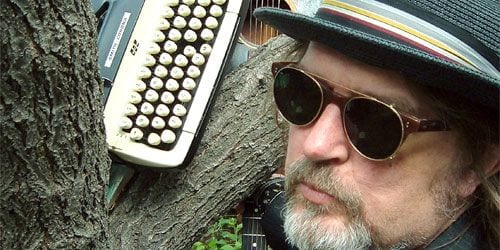
Like most special musicians, Peter Case has many sides to his musical personality. He first came to prominence during the new wave rock movement in the late ’70s with the Plimsouls. Heck, that band even had screen time in Valley Girl, a movie that fed upon the cultural quirks of ’80s Los Angeles. But beginning with a T-Bone Burnett-produced, self-titled solo album in 1986, Case started to more freely show off the acoustic folk side of his personality. Although primarily acoustic, many of these solo projects also mixed a little rock in with the folk. But Let Us Now Praise Sleepy John is, except for a few brief exceptions, the straight acoustic folk stuff.
“There are two kinds of justice,” Case states during “Million Dollars Bail”. “One’s for folks up on the hill / The other’s down below.” And for much of Let Us Now Praise Sleepy John, Peter argues the case of those “down below”.
This CD’s title was inspired by blues singer Sleepy John Estes and it’s a relatively timeless work. Nevertheless, a few lyrical lines give away its contemporary created-by date, such as the girl with the crack cocaine problem in “Million dollars Bail”, as well as the faded 8 X 10 photo of Telly Savalas sung about during “Palookaville”.
One particularly telling line comes from “Million Dollars Bail”. “Anything can happen when you’re walkin’ in your sleep,” Case announces truthfully. And you get the feeling many of these song characters are just sleepwalking through life, which then gets them into trouble. For instance, there’s the character in “Million Dollars Bail” who “they said she was a single girl that lived a double life”. She sure better wakeup.
Many of these “down below” folks are also society’s homeless. “Underneath The Stars” recounts what life is like at night for one particular displaced woman. Later on, “The Open Road Song” finds a father explaining a bum’s life to his young son. But rather than deterring the boy, this hobo life only entices the kid in a Jack Kerouac-y way. “When I grow up I want to be a bum,” the son eventually tells his dad.
This is a sparse CD, sonically, and clearly inspired by Woody Guthrie’s equally stripped down recordings. For instance, “Get Away Blues” features wonderful acoustic blues guitar work. Even so, before he’s all done Case adds a few extra instrumental colorings. “I’m Gonna Change My Ways” features electric guitar and “The Soul Twist” works in subtle steel guitar.
The first half of this project details the downtrodden, like an investigative journalist on the beat. But the second part begins to express guarded optimism. “Ain’t Gonna Worry No More” is a song of determination to make life better after “the ghost is gone.” “I’m Gonna Change My Ways” expresses similar self-determination. “Palookaville”, however, is a song that sympathizes with a loser who never made the big time. “You could have been somebody, could have been somebody to see.”
Let Us Now Praise Sleepy John, even with its empathy for the less fortunate among us, is nevertheless not a “big statement” CD. It is more of an observational work, instead, where Case tells it like he sees it. When he sings about the two different kinds of justice during “Million Dollars Bail”, he isn’t out to help tip the scales of justice in favor of the poor; he’s just stating the truth. But because Case doesn’t appear to be trying too hard to make a big statement, his songs come off more natural, believable, and enjoyable.
Had this CD been recorded by a higher profile artist, it would have sacrificed much of its believability. Case, even with his Hollywood moments in the Plimsouls, has never been a music superstar. Although such lack of popularity is a shame — Case is more talented than most of the artists on the charts — his loss is our gain because he can continue to record CDs like Let Us Now Praise Sleepy John, where we believe every word he sings.

![Call for Papers: All Things Reconsidered [MUSIC] May-August 2024](https://www.popmatters.com/wp-content/uploads/2024/04/all-things-reconsidered-call-music-may-2024-720x380.jpg)



